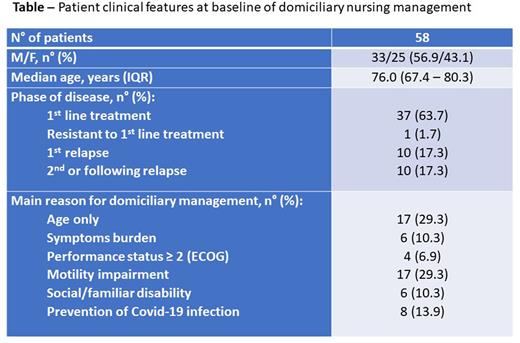Abstract
Background Covid-19 pandemia constituted in the last two years a challenge in the management of frail patients (pts) with Multiple Myeloma (MM). The availability in the Viterbo province of a Domiciliary Hematologic Care Unit (DHCU) allowed a correct clinical assistance of our pts with MM during Covid-19 pandemia.
Methods To evaluate the impact and efficacy of nursing management for frail MM pts followed by DHCU during Covid-19 pandemia, all nursing activities from 3/2020 to 3/2022 were analysed. Chemotherapies (CHT) allowed for nurse parenteral administration in MM pts were bortezomib and, more recently, daratumumab for subcutaneous injection.
Results In the study period, 58 pts in 35 different municipalities of Viterbo province were followed by 4 nurses specifically dedicated to DHCU. Main features of the pts at DHCU admission are reported in the Table: at DHCU admission, 30 pts (51.8%) aged > 75 years. At beginning of the study period (08/03/2020), 17 pts (29.3%) were already followed by DHCU, while 41 pts (70.7%) entered DHCU assistance during the study period. Median distance from DHCU central site in Viterbo to pts house was 28 Km [Interquartile range (IQR) 20 - 38]: in particular, distance from DHCU was < 20 Km in 11 cases (19.0%), ≥ 20 < 40 Km in 33 (56.9%) and ≥ 40 Km in 14 (24.1%). A total number of 1637 nursing accesses was done in the whole period. According to the type of different procedures, 722 blood samples were performed, with a median number of 9 (IQR 4 - 15): in addition, there were 617 accesses for CHT administration (152 bortezomib-based cycles in 37 pts, 6 daratumumab-based cycles in 3 pts) and 298 accesses for other procedures (132 PICC medications, 114 therapies other than CHT, 29 assistances for transfusions, 17 assistances for marrow aspirates and 6 antigenic tests). In the study period, 5 pts (8.6%) developed Covid-19 infection. At the last follow-up (31/03/2022), 35 pts (60.3%) were alive and still in DHCU, 11 pts (19.0%) were alive and returned to Day-Hospital (DH) setting due to clinical improvement and 12 pts (20.7%) died while in domiciliary assistance.
Conclusions Domiciliary nurse assistance during Covid-19 pandemia allowed to follow in a safer way compared to standard DH setting an important number of frail pts with MM, two/thirds of them in 1st active line of therapy. This peculiar type of nursing management should represent the best type of assistance for elderly and/or frail pts even beyond Covid-19 period of pandemia.
Disclosures
Latagliata:BMS: Honoraria; Novartis: Honoraria.
Author notes
Asterisk with author names denotes non-ASH members.


This feature is available to Subscribers Only
Sign In or Create an Account Close Modal